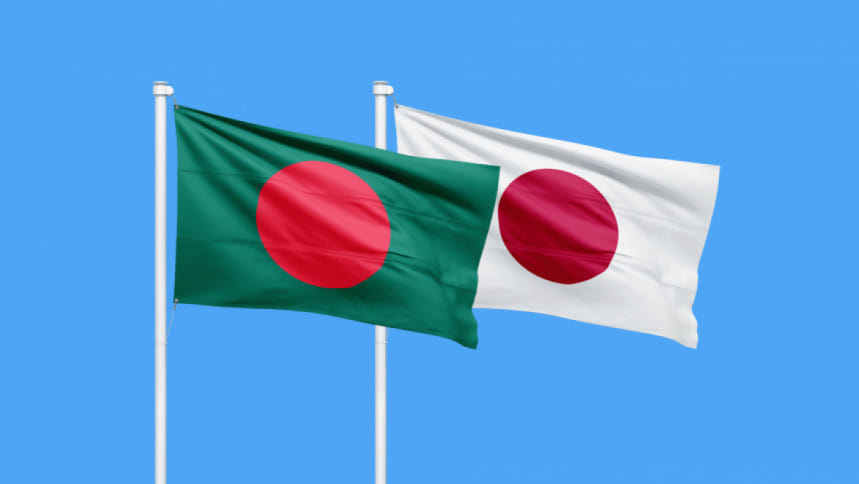Bangladesh, Japan agree to sign FTA

Bangladesh and Japan have primarily agreed on signing a free trade agreement (FTA) to increase trade and investment, said Commerce Minister Tipu Munshi yesterday.
"Bangladesh and Japan are positive on signing an FTA," he told The Daily Star over the phone. The minister is scheduled to declare a joint statement on the signing at a meeting at the ministry today.
This is the first formal meeting for signing the FTA as both sides think it is possible to sign a win-win deal, said the minister, adding that no specific date has been set for the signing.
"We are still in a primary stage until now for signing the FTA…Our team has been working with the Japanese team for advancing the negotiation," Munshi said.
Bangladesh has been negotiating with several trade partners to sign FTAs, preferential trade agreements (PTAs), comprehensive economic partnership agreements (CEPAs) and Comprehensive economic trade partnership agreements (CETAs).
These are mainly aimed at retaining Bangladesh's preferential trade benefits once it makes the United Nations status graduation from a least developed to a developing nation in 2026.
Retaining the preferential trade benefits is important because of the country's total export of more than $52 billion last year, more than 73 per cent was induced by the Generalised System of Preferences (GSP).
In other words, more than 73 per cent of the country's exports were under duty preferences as a least developed country (LDC).
However, the LDC trade benefit will come to an end with the LDC graduation of the country in 2026 and in 2029 in the European Union (EU) as the EU has offered a grace period of three years to prepare for the graduation.
Trade experts and analysts said more than $7 billion worth of exports from Bangladesh may be affected due to erosion of the preferential trade.
This is due to the fact that local exporters will face more than 9 per cent in duty on shipment of goods to different countries, except to the US, after the LDC graduation.
However, another school of thought said Bangladesh's exports would not be affected after the graduation as the local garment exporters have been performing strong in the US markets.
This was in the face of one of the highest tariff rates of 15.62 per cent to the US where garment shipments grew by 50 per cent last year. This rate is still persisting.
Moreover, Bangladeshi goods are still competitive in terms of prices compared to goods of other countries.
For instance, if the sales value of a garment item of Bangladesh to the EU is at $2, the EU retailers and brands are buying the same item at more than $5 per piece.
This indicates that there is still room for negotiations over prices for Bangladeshi exporters, said experts.
So, the export of Bangladesh may not be affected even after the LDC graduation, the they added.
Japan is the first country among Asian nations where the value Bangladesh's annual shipments has already crossed the $1 billion mark nearly a decade ago, buoyed by garments.
So more than 85 per cent of the nearly 338 Japanese companies operating in Bangladesh want an FTA to be signed for a boost to bilateral trade and investment, according to a survey by Japan External Trade Organization (JETRO) in June this year.
According to the survey outcomes, both governments have started negotiations for signing the FTA.
A memorandum of cooperation for signing the deal was supposed to be signed during the visit of Prime Minister Sheikh Hasina in November this year but unfortunately the tour was postponed.
Last fiscal year Bangladesh exported goods worth $1.35 billion, a year-on-year rise of 14.40 per cent, according to data from the Export Promotion Bureau (EPB). Of it, $1.10 billion was from garments.
A Japanese Special Economic Zone at Araihazar at Nayaranganj was inaugurated on December 6 to facilitate Japanese investments in Bangladesh.
Shipment of garment items to Japan from Bangladesh started leapfrogging since April 2011, when Japan relaxed its Rules of Origin for the LDCs and for knitwear sector.
Earlier, Japan did not allow zero-duty on shipment for knitwear to protect its indigenous knitwear sector.
Recently, Japanese Ambassador to Bangladesh ITO Naoki said the apparel shipments were expected to rise tenfold to reach $10 billion by 2030.
Bangladesh mainly imported $2.34 billion worth of capital machinery, textile and garment accessories, food and beverage, logistic materials and electronic home appliances from Japan last year.
Md Anwar Shahid, secretary general of the Japan Bangladesh Chamber of Commerce and Industry, said they want an FTA to be signed between the two countries as soon as possible.
"Because we have a very big potential of increasing trade with Japan if the FTA is signed," he told The Daily Star over the phone.

 For all latest news, follow The Daily Star's Google News channel.
For all latest news, follow The Daily Star's Google News channel. 



Comments